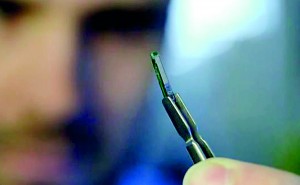Sunday Times 2
New medical lab implant will automatically phone a doctor before you fall ill
View(s):By Mark Prigg
A blood laboratory small enough to be implanted under the skin could revolutionise healthcare, researchers claimed today.
Measuring just 14mm long, it uses a mobile phone to send medical staff updates on a patient’s health.

The tiny medical lab can be implanted under the skin
The team at the École polytechnique fédérale de Lausanne say the gadget could be invaluable for patients undergoing chemotherapy, and could even warn of an impending heart attack by monitoring key chemicals in the bloodstream.
The implant is only a few cubic millimeters in volume but includes five sensors, a radio transmitter and a power delivery system.
Outside the body, a battery patch provides 1/10 watt of power, through the patient’s skin – so there is no need to operate every time the battery needs changing.
The researchers behind the device say it will allow doctors to monitor high risk patients from anywhere.
To capture the targeted substance in the body — such as lactate, glucose, or ATP — each sensor’s surface is covered with an enzyme.
‘Potentially, we could detect just about anything,’ said De Micheli.
‘But the enzymes have a limited lifespan, and we have to design them to last as long as possible.’
The enzymes currently being tested are good for about a month and a half; that’s already long enough for many applications.
‘In addition, it’s very easy to remove and replace the implant, since it’s so small.’
In patients with chronic illness, the implants could send alerts even before symptoms emerge, and anticipate the need for medication.
‘In a general sense, our system has enormous potential in cases where the evolution of a pathology needs to be monitored or the tolerance to a treatment tested.’
Researchers hope the system will be commercially available within 4 years.
© Daily Mail, London
Follow @timesonlinelk
comments powered by Disqus


















